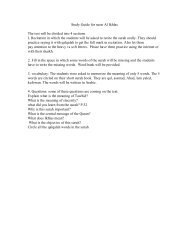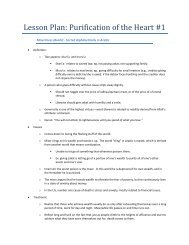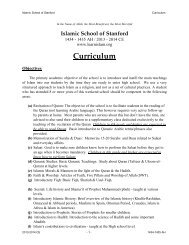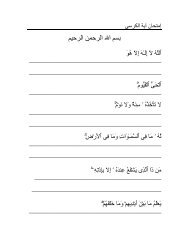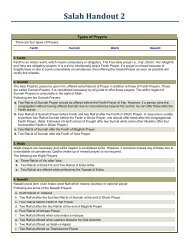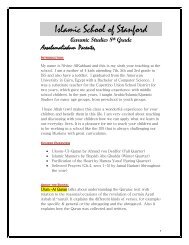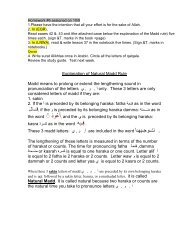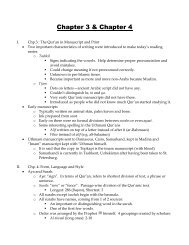Quranic Reflections - Islamic School of Stanford
Quranic Reflections - Islamic School of Stanford
Quranic Reflections - Islamic School of Stanford
You also want an ePaper? Increase the reach of your titles
YUMPU automatically turns print PDFs into web optimized ePapers that Google loves.
The people <strong>of</strong> Al-Hijr did not believe in Allah’s (SWT) miracles and refused to follow<br />
the path <strong>of</strong> Iman (belief in Allah (SWT)). Consequently, they felt that Allah (SWT)<br />
was going to punish them, so they began to search for a place where they could feel<br />
secure. The only place they found was Al-Hijr or the ‘rocky tract’. In this new found<br />
home, they began to develop their civilization to an extent where they were hewing<br />
out houses from the mountain’s rocks to feel secure. Allah (SWT) says in the Qur’an<br />
what can be translated as, “And verily, the dwellers <strong>of</strong> Al-Hijr (the rocky tract)<br />
denied the Messengers. And We gave them Our Signs, but they were averse to<br />
them. And they used to hew out dwellings from the mountains (feeling<br />
themselves) secure.” (TMQ, 15:80-82). They believed that if they lived within these<br />
mountains, they would shield themselves against the punishment and torture <strong>of</strong> Allah<br />
(SWT). This is why they began to build their houses within the mountains to protect<br />
themselves from floods and other natural disasters. So what happened<br />
Allah (SWT) says in the Qur’an what can be translated as, “But As-Saihah (torment -<br />
awful cry) overtook them in the early morning (<strong>of</strong> the fourth day <strong>of</strong> their<br />
promised punishment days).” (TMQ, 15:83) No wall or mountain was able to<br />
protect them from that cry which came in the early morning, which is a sign <strong>of</strong><br />
security, whereas night is always associated with fear and insecurity. It is as if the<br />
message to man is that protection comes from Allah (SWT) alone.<br />
Do not be in astonishment with their civilization. It did not protect them from the<br />
might that Allah (SWT) mentions at the start <strong>of</strong> the surah. The method in which the<br />
tribe <strong>of</strong> Thamood was punished was unique in the sense that no other people had<br />
experienced it; a Saihah or an awful cry which no wall, wind, water, or rock can serve<br />
as protection.<br />
This is why the surah was named Al-Hijr as a symbol <strong>of</strong> the strength <strong>of</strong> civilizations<br />
that could overwhelm us. It reminds us not to be overcome by such nations,<br />
reminding us that there is no protector except Allah (SWT).<br />
The story <strong>of</strong> Lut (AS) (Lot)<br />
To reiterate this meaning, Allah (SWT) mentions the story <strong>of</strong> Lut (AS) with obvious<br />
signs. The people <strong>of</strong> Lut (AS) were punished when they were at the peak <strong>of</strong> dwelling<br />
in their lusts. Allah (SWT) says in the Qur’an what can be translated as, “Verily, by<br />
your life (O Muhammad SAWS), in their wild intoxication, they were wandering<br />
blindly” (TMQ, 15:72). They were also punished in the morning as Allah (SWT)<br />
says what can be translated as, “And We made known this decree to him, that the<br />
root <strong>of</strong> those (sinners) was to be cut <strong>of</strong>f in the early morning.” (TMQ, 15:66)<br />
Allah (SWT) also describes their punishment in what can be translated as, “So As-<br />
Saihah (torment - awful cry) overtook them at the time <strong>of</strong> sunrise” (TMQ,<br />
15:73).<br />
Guidelines for callers <strong>of</strong> Allah (SWT) throughout time<br />
Now that the reader <strong>of</strong> this surah has come to feel and appreciate the extent to which<br />
Allah (SWT) protects the believers in a way that no one else can, the surah begins to<br />
provide important guidelines, derived from the stories included in it, that implement<br />
its objectives:



